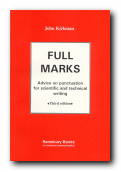advice on punctuation for scientific and technical writing
Do scientists and technical writers need special advice on punctuation? Well, in one sense – who doesn’t? John Kirkman sets out here to answer what he describes as ‘the queries raised most frequently by practitioners in computing, engineering, medicine, and science as they grapple with day-to-day tasks in writing and editing’. So, it’s a guide based on practical experience, and probably the better for it. Punctuation for Scientists is a specialist style guide aimed at practicioners in these disciplines.
 There is an introduction explaining why good punctuation is necessary. This is slightly more complex than it needs to be, and might more usefully been placed at the end of the book. But after that he gets down to a simple explanation of the basics – apostrophes, capitals, colons, commas, full stops, hyphens, and quotation marks. The advice might be aimed at technical authors, but there’s no reason why other writers shouldn’t profit from it.
There is an introduction explaining why good punctuation is necessary. This is slightly more complex than it needs to be, and might more usefully been placed at the end of the book. But after that he gets down to a simple explanation of the basics – apostrophes, capitals, colons, commas, full stops, hyphens, and quotation marks. The advice might be aimed at technical authors, but there’s no reason why other writers shouldn’t profit from it.
One of the strengths of the book is that it has plenty of practical examples. Another is that John Kirkman has spent quite some time teaching in the USA, and he offers UK/US equivalents wherever appropriate, which gives the guide some added value for those who need to keep such matters in mind.
On the whole, he wisely avoids the jargon of grammar in his explanations, but there’s rather a lot of intrusive first person singular (which doesn’t always inspire confidence) and some of the advice is expressed in terms which are likely to confuse the very people it is written for:
English teachers may have told you that you should always signal restrictive intention by starting your relative clause with that…
Of course one might quibble with some of his recommendations (are continuous capitals ever necessary?) but he offers very sensible and non-dogmatic advice on issues such as the use of the hyphen in terms like ‘re-activate’, ‘de-energise’, and ‘re-adjust’, and he quite rightly alerts his readers to the different names used for brackets, parentheses, and braces in the UK, the US, and non-scientific writing. To a beginner this might seem like pedantry, but ultimately it’s the stuff of which accuracy and scholarship is made.
There are three appendices – one on paragraphing, one on word division (hyphenation at line ending) and one on differences between UK and US English. There’s a brief bibliography, a full index, and by current book price standards, it’s dirt cheap.
© Roy Johnson 2000
John Kirkman, Full Marks: Advice on punctuation for scientific and technical writing, (3rd edn) Wiltshire: Ramsbury, 1999, pp.115, ISBN: 0952176246
More on study skills
More on writing skills
More on online learning